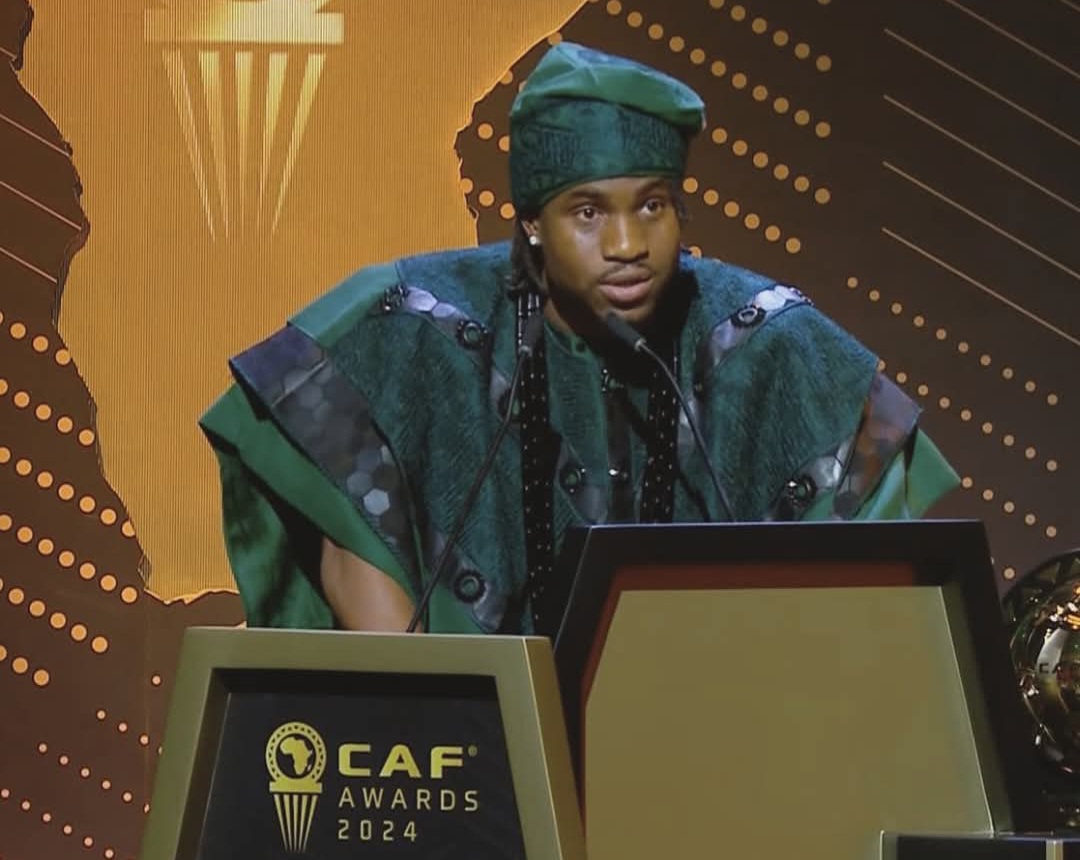As the dust settles on the 2024 Confederation of African Football (CAF) Awards held at the Palais des Congrès in Marrakech, Morocco, on Monday night, Nigeria finds itself basking in a moment of sporting glory that transcends the boundaries of mere athletic achievement.
Super Eagles Forward, Ademola Lookman’s coronation as the African Player of the Year is not just a personal triumph but a powerful testament to the indomitable spirit of Nigerian talent that continues to shine on the continental and global stage.
The significance of Lookman’s achievement cannot be overstated. His hat-trick in the Europa League final – for his club Atalanta against Bayern Leverkusen – was the first in over four decades. This is more than a statistical marvel; it is a clarion call that announces Nigeria’s continued relevance in global football.
This is not an isolated incident but part of a rich tradition. Lookman becomes the sixth Nigerian to win this prestigious award, joining an illustrious list that includes football legends Rashidi Yekini (1993), Emmanuel Amuneke (1994), Nwankwo Kanu (1996 and 1999), Victor Ikpeba (1997), and most recently, Victor Osimhen (2023).
The statistics tell a compelling story. From Yekini in 1993 to Lookman in 2024, these awards trace a narrative of Nigerian footballing excellence that has consistently punched above its weight on the continental and global stage. Yet, this success is not merely about individual achievements but about a systemic potential that remains largely untapped.
The awards ceremony was a comprehensive celebration of Nigerian football prowess. The Super Falcons’ recognition as the Women’s National Team of the Year and Chiamaka Nnadozie’s win as Women’s Goalkeeper of the Year further underscore the depth and diversity of talent that exists within Nigerian sports.
This comes on the heels of a commendable performance at the Africa Cup of Nations, where the Super Eagles finished as runners-up, demonstrating the country’s growing footballing might.
President Bola Tinubu’s response captures the national sentiment perfectly. His description of these athletes as “worthy ambassadors” who showcase the best of Nigeria resonates deeply. “These athletes embody the essential Nigerian Spirit,” the President declared, a statement that goes beyond mere political platitude. It is a recognition of the potential that exists when talent meets opportunity.
However, these individual and collective achievements must not be viewed as endpoints but as waypoints in a much longer journey of sports development.
The harsh reality is that for every Lookman or Osimhen who makes it to the global stage, hundreds of talented young Nigerians remain undiscovered, their potential stifled by a lack of infrastructure, investment, and systematic support.
In the considered opinion of this newspaper, the importance of grassroots sports development cannot be overemphasized.
In a country blessed with an abundance of human capital, the failure to create robust pathways for talent discovery and nurturing is not just a missed opportunity but a strategic national failure.
The timing of these awards is particularly poignant. Coming in the wake of external criticism – notably from British Conservative Party leader Kemi Badenoch – these sporting triumphs serve as a powerful counter-narrative. They demonstrate that Nigeria’s potential is not defined by its challenges but by the extraordinary individuals who continue to excel against all odds.
It is worth noting that football remains one of the few domains in Nigeria that genuinely unites the nation. In a country often fragmented by political, ethnic, and religious divisions, the beautiful game provides a common ground. When Lookman scores, when the Super Falcons triumph, Nigerians speak with one voice, celebrate with one heart.
Similarly, Nigeria should do everything possible to qualify for the World Cup in 2026. Appearing at international competitions for Nigeria is a bare minimum. An average football lover in Nigeria sees qualification for international tournaments as a right.
To the National Sports Commission (NSC) and Nigeria Football Federation (NFF), the mandate is clear: discover, nurture, and celebrate talent. The infrastructure for sports development must be treated as a critical national priority. This means investing in training facilities, creating transparent talent identification programs, and ensuring that young athletes have clear pathways to professional success.
As we celebrate Lookman, Nnadozie, and the Super Falcons, we must also celebrate the countless unnamed talents waiting to be discovered. Their potential represents not just a sporting opportunity but a broader national asset. In their success lies a powerful message: Nigeria’s greatest resource is not its oil or mineral wealth, but its people.
The CAF Awards are more than a moment of sporting glory. They are a reminder of what is possible when talent is nurtured, when potential is recognised, and when a nation believes in itself. These awards are a beacon of hope, a signal that with dedication, skill, and opportunity, global recognition is within reach.
Indeed, football is more than a game in Nigeria. It is a metaphor for national resilience, a testament to the extraordinary potential that resides within our young population. Today, we celebrate Lookman, Nnadozie, and the Super Falcons. Tomorrow, we must ensure that their success is not an exception, but a norm.
